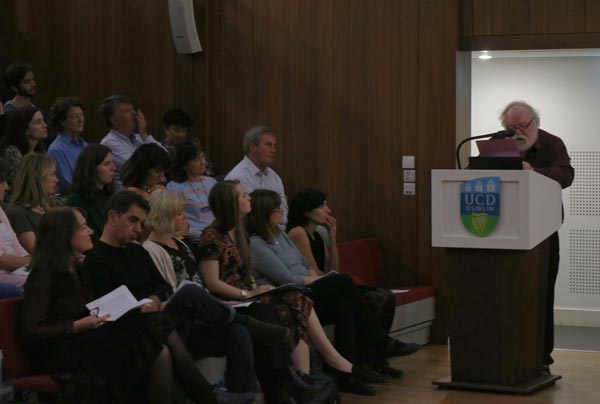
Only a fervent admiration of Edna O’Brien could draw me to UCD on a blustery Monday evening. Last night saw some of the biggest names in modern Irish literature gather to celebrate O’Brien’s lasting yet controversial legacy in UCD’s student centre. The event, organised by Dr Dan O’Brien and PHD student Eve Kearney, expressed the indelible impact left by O’Brien in the wake of a career spanning over 60 years.
O’Brien’s unabashed descriptions of sexuality and social issues led to the banning and burning of her first novel, The Country Girls. However, Ireland’s repressive censorship board could not dissuade O’Brien from writing explicitly even when the truth about female sexuality was considered obscene and the public’s social voice was silenced.
First up, Frank McGuinness exalted O’Brien’s writings for their delicate portrayals and profound understanding of human nature. McGuinness began his discussion by hailing O’Brien as an “absolute hero” before reading passages from her short stories, The Mouth of the Cave and Black Flower, stories that McGuinness described as having the ability to “shock us in to being what we are: lonely and lost”.
Throughout her career, O’ Brien never failed to take the unconventional route. Her novel, In the Forest, depicts the murder of Imelda Riney, her son Liam and Father Joe Walsh. The novel received mixed reviews and was lambasted by Fintan O’Toole of the Irish Times as it had “broken an unspoken rule and crossed the boundary into private grief”.
In his discussion, Sean O’Reilly contended that the novel’s brilliance is found in the way it “lures the reader in to frightening proximity of the killer’s mind”. He spoke of the major risk that O’Brien took in excluding a meta-narrative from the novel, which left the story with “no authoritative voice, no empathetic distance, no master”. O’Reilly finished by saying that, “In the Forest is dangerous writing, it takes you to places no one talks about, where fact and fiction are inseparable like the dancer from the dance”.
Speaking to The University Times after the event, organiser Eve Kearney she emphasised how O’ Brien has “been overlooked for so long. In the 1980s and 1990s, she was very much regarded as just a sexy writer of sexy stories. If you go in to a secondhand book shop, you’ll see all her book covers as half-naked women. The more that we have been removed from the sensationalism of her texts, the more we are appreciating them for being texts on their own”.
Louise Nealon likewise emphasised that O’Brien is not just some “sexy writer” in her discussion of Down by the River. The novel, published in 1997, was based on 1992’s X case involving a 14-year-old girl who became pregnant after she was raped and was prevented from travelling to England for an abortion. Nealon lauded O’Brien for being “decades ahead of her native country in expressing painful truths”.
“Like all great writers”, said Nealon, “Edna O’ Brien suffered from an awful affliction, the need to tell the truth”. Quoting from O’Brien, Nealon read: “Most of us in the world are hypocrites and liars a lot of the time as we gloss. We don’t want our vulnerability known, we don’t want our sexuality known, we don’t want our age rage, we don’t want those things expressed but I do and therefore I do upset, I think all writers do.” Nealon closed by underlining how indebted she is to O’Brien for “writing words before we realised they needed to be written” and for giving Irish writers the courage to speak out about the unspeakable.






